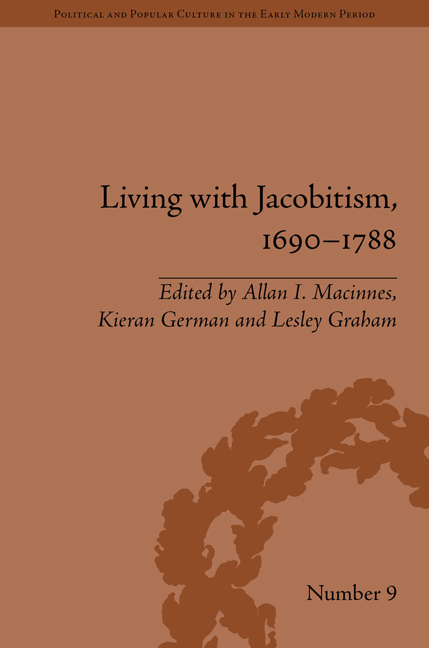Book contents
- Frontmatter
- CONTENTS
- List of Contributors
- List of Figures
- Abbreviations
- Preface: Breandán Ó Buachalla, A Tribute
- Introduction: Living with Jacobitism
- 1 The First Jacobite and the Scottish Parliament
- 2 The Scottish Jacobite Community at Saint-Germain after the Departure of the Stuart Court
- 3 Liturgy: The Sacramental Soul of Jacobitism
- 4 ‘Zealous in the Defence of the Protestant Religion and Liberty’: The Making of Whig Scotland, c. 1688–c. 1746
- 5 Jonathan Swift's Memoirs of a Jacobite
- 6 ‘Female Rebels’: The Female Figure in Anti-Jacobite Propaganda
- 7 Commerce and the Jacobite Court: Scottish Migrants in France,1688–1718
- 8 Ultramontane Ultras: The Intellectual Character of Irish Students at the University of Paris
- 9 To a Fair Meeting on the Green: The Order of Toboso and Jacobite Fraternalism, 1726–c. 1739
- 10 English and Scottish Jacobite Painters in Eighteenth-Century Rome
- 11 Polite War: Material Culture of the Jacobite Era, 1688–1760
- 12 Robert Adam: ‘My Mother's Dear British Boy’
- 13 From Jacobite to Jacobin: Robert Watson's Life in Opposition
- 14 Robert Louis Stevenson's ‘The Young Chevalier’: Unimagined Space
- Notes
- Index
13 - From Jacobite to Jacobin: Robert Watson's Life in Opposition
- Frontmatter
- CONTENTS
- List of Contributors
- List of Figures
- Abbreviations
- Preface: Breandán Ó Buachalla, A Tribute
- Introduction: Living with Jacobitism
- 1 The First Jacobite and the Scottish Parliament
- 2 The Scottish Jacobite Community at Saint-Germain after the Departure of the Stuart Court
- 3 Liturgy: The Sacramental Soul of Jacobitism
- 4 ‘Zealous in the Defence of the Protestant Religion and Liberty’: The Making of Whig Scotland, c. 1688–c. 1746
- 5 Jonathan Swift's Memoirs of a Jacobite
- 6 ‘Female Rebels’: The Female Figure in Anti-Jacobite Propaganda
- 7 Commerce and the Jacobite Court: Scottish Migrants in France,1688–1718
- 8 Ultramontane Ultras: The Intellectual Character of Irish Students at the University of Paris
- 9 To a Fair Meeting on the Green: The Order of Toboso and Jacobite Fraternalism, 1726–c. 1739
- 10 English and Scottish Jacobite Painters in Eighteenth-Century Rome
- 11 Polite War: Material Culture of the Jacobite Era, 1688–1760
- 12 Robert Adam: ‘My Mother's Dear British Boy’
- 13 From Jacobite to Jacobin: Robert Watson's Life in Opposition
- 14 Robert Louis Stevenson's ‘The Young Chevalier’: Unimagined Space
- Notes
- Index
Summary
If the ‘adventurer’ Robert Watson of Elgin is remembered, it is as the secretary and biographer of Lord George Gordon; as an organizer in the London Corresponding Society; and as a negotiator in the sale of the Stuart Papers to the Crown in 1817. This chapter traces Watson's political career from Jacobite origins to Jacobite activism, and to exile in Paris and Rome. Finding documents and souvenirs in post-Jacobite and exilic circles, Watson preserved the material remains of multiple anti-Hanoverian movements – Jacobite, radical Whig, Jacobin – to create a genealogy of opposition for the post-Napoleonic age. This was not nostalgia, but radical antiquarianism.
The Strange Death of a ‘Hoary Patriot’
Returning to London from Boulogne in March 1838, Robert Watson lodged at the Blue Anchor, an old tavern near the Billingsgate fish market. A ‘little lame man’ of ‘very reserved habits’, on 19 November 1838 Watson was found dead in bed. His nightcap was pulled down over his face and his neck cloth had been twisted tight with the fire poker, which Watson ‘still held firmly clenched in both hands’. The coroner counted nineteen wounds on Watson's ninety-two-year-old corpse, none of them recent. The jury concluded that Watson had ‘destroyed himself in a state of temporary mental derangement’. In late spring Watson had been to Bath to deposit ‘a box of important papers’ with a relative.
- Type
- Chapter
- Information
- Living with Jacobitism, 1690–1788The Three Kingdoms and Beyond, pp. 185 - 196Publisher: Pickering & ChattoFirst published in: 2014



